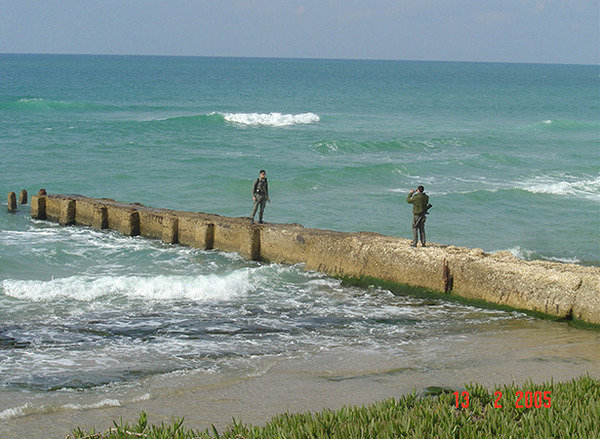Fire and Forget. On Violence
dal 12/6/2015 al 29/8/2015
Segnalato da
Marina Abramović and Ulay
Ron Amir
Julius von Bismarck
Roy Brand
Ori Scialom
Keren Yeala Golan
James Bridle
Luis Camnitzer
Mircea Cantor
Jota Castro
Chto Delat
Marcelo Cidade
Jem Cohen
Martin Dammann
Oyvind Fahlstrom
Harun Farocki
Daniil Galkin
Rudolf Herz
Damien Hirst
Clara Ianni
Emily Jacir
Hunter Jonakin
Joachim Koester
Korpys Loffler
Barbara Kruger
Armin Linke
Robert Longo
Jazmín Lopez
Kris Martin
Ana Mendieta
Michael Muller
Timo Nasseri
Katja Novitskova
Jon Rafman
Pipilotti Rist
Andre Robillard
Julian Roder
Henning Rogge
Martha Rosler
Hrair Sarkissian
Santiago Sierra
Timur Si Qin
Tal R
Javier Tellez
Sharif Waked
Gillian Wearing
He Xiangyu
Amir Yatziv
Ala Younis
Ellen Blumenstein
Daniel Tyradellis
12/6/2015
Fire and Forget. On Violence
KW Institute for Contemporary Art, Berlin
The group exhibition takes the military expression as the starting point for an examination of the conventional ideas about war and force. It is oriented towards the most visible agent of violence: weapons.

Curated by Ellen Blumenstein and Daniel Tyradellis
Fire and forget comes from military jargon, and is a term for weapons systems that are no longer used in direct combat with an enemy but are launched from a safe distance. The group exhibition FIRE AND FORGET. ON VIOLENCE takes the military expression as the starting point for an examination of the conventional ideas about war and force. It is oriented towards the most visible agent of violence: weapons.
FIRE AND FORGET. ON VIOLENCE applies the means of contemporary art to address the long-term effects of these new weapons on the human psyche. The loss of a direct, physical confrontation and the danger for one’s own life it had created, separates the violent situation itself from affects like reluctance for killing or overreaction, sympathy or hate. What may this mean for the arguments and evidence of political action? Which meaning does this context of the story receive: the memory and forgetting of an outburst, escalation, or the prevention of violence? And which interest does art have in all this?
The publication accompanying the exhibition, as well as its public and education program, illuminate the theme from other disciplinary perspectives: The book FRIENDLY FIRE & FORGET (Matthes & Seitz Berlin) collects literary texts produced for the occasion by German and international authors, including Schorsch Kamerun, Wladimir Kaminer, and Kathrin Passig. On selected dates, guests who have been personally effected by violence or who deal with it professionally lead tours through the exhibition, or discuss possible ways of engaging with it from theatrical, film, or musical points of view, among them Antonia Baum, Ulrich Matthes, and Rosa von Praunheim.
With works by Marina Abramović and Ulay; Ron Amir; Julius von Bismarck; Roy Brand, Ori Scialom, and Keren Yeala Golan; James Bridle; Luis Camnitzer; Mircea Cantor; Jota Castro; Chto Delat; Marcelo Cidade; Jem Cohen; Martin Dammann; Öyvind Fahlström; Harun Farocki; Daniil Galkin; Rudolf Herz; Damien Hirst; Clara Ianni; Emily Jacir; Hunter Jonakin; Joachim Koester; Korpys/Löffler; Barbara Kruger; Armin Linke; Robert Longo; Jazmín López; Kris Martin; Ana Mendieta; Michael Müller; Timo Nasseri; NEOZOON; Katja Novitskova; Jon Rafman; Pipilotti Rist; Robbert&Frank Frank&Robbert; André Robillard; Julian Röder; Henning Rogge; Martha Rosler; Hrair Sarkissian; Santiago Sierra; Timur Si-Qin; Tal R; Javier Téllez; Sharif Waked; Gillian Wearing; He Xiangyu; Amir Yatziv; and Ala Younis.
The exhibition is funded by the Kulturstiftung des Bundes (German Federal Cultural Foundation).
With thanks for the financial support of: KW Friends e. V. as well as Rivka Saker, the collector Uli Sigg, Mr. Xue, Peng Pei-Cheng, Outset Contemporary Art Fund, Contemporary Fine Arts Berlin, KOW Berlin.
The publication and event and educational program are funded by the Bundeszentrale für politische Bildung/bpb (German Federal Agency for Civic Education).
The cultural programs of KW Institute for Contemporary Art are made possible with the support of the Governing Mayor of Berlin – Senate Chancellery – Cultural Affairs.
Image: Mircea Cantor, Shooting, 2005. Courtesy the artist and Dvir Gallery. © Mircea Cantor.
Press Contact:
Henriette Sölter
T +49 (0) 30 2434 59 42 / press@kw-berlin.de
Opening: 13 June, 17–22h
KW Institute for Contemporary Art
Auguststraße 69
10117 Berlin
Hours: Wednesday–Monday noon–7pm,
Thursday noon–9pm



